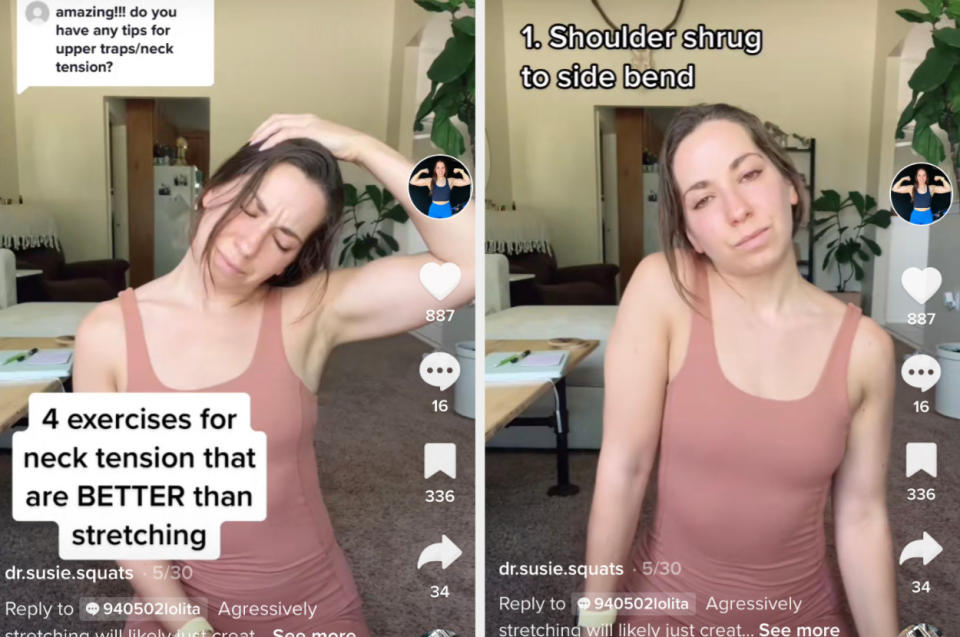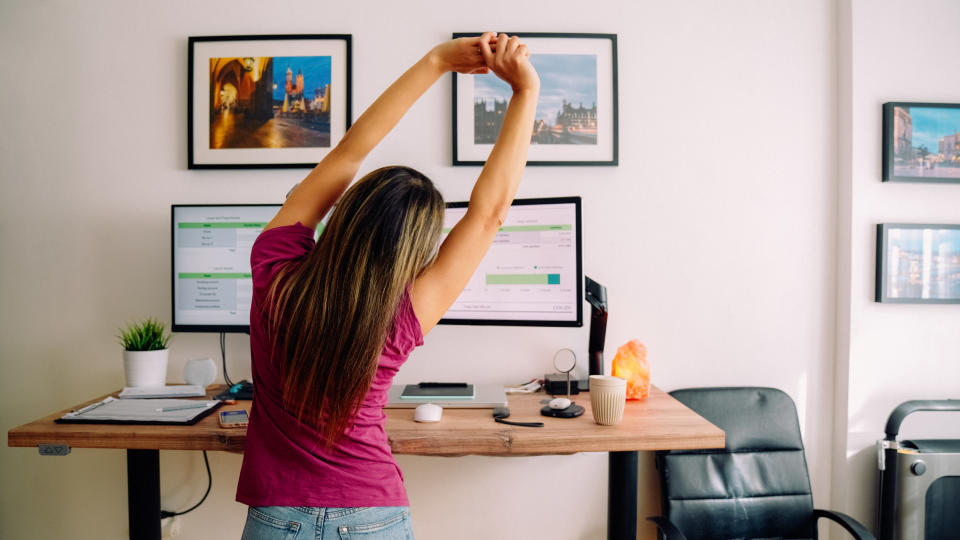This TikTok By A Physical Therapist Melted My Upper Back Knot In Less Than A Minute
As someone who sits all day (and who cannot sit in a chair like a normal person), I typically have more knots in my shoulders and neck than a macrame tutorial. So when I came across a viral TikTok from Dr. Susie Spirlock PT, DPT, PPCS showing a quick exercise for relieving upper-back pain, I was instantly intrigued.
Note: If you have injuries or other conditions, consult with a physician before starting a new movement routine.
In the video, Dr. Spirlock (aka @dr.susie.squats) demonstrates a thoracic rotation on her hands and knees with one hand behind her head. She starts by tapping her elbow to the floor next to her hand.

Then she extends it to the ceiling like so.

The whole move all together looks like this:
@dr.susie.squats / Via tiktok.com
I started with eight medium-slow reps on each side, and I was shocked by how much lighter and looser my shoulders felt right away. I especially loved the part of the move where my elbow points up to the ceiling, drawing the shoulder blades together and opening the chest. I tend to hunch forward, and this move feels like it's really counteracting that habit.

I was amazed at how this 30-second move melted the knot between my shoulder blades in a way that stretching, heat, ice, and massage never have. So I reached out to Dr. Spirlock to learn more about relieving pain and how to prevent it in the first place.
Dr. Spirlock says, unsurprisingly, that sitting can do a real number on your spine's flexibility. "Our spines were literally designed to move. When they don’t get the movement they want, spines can become stiff."

"This stiffness can then lead to compression of nerves, a sensation of tightness in surrounding muscles, or referred pain patterns. Rotating, extending, and bending these areas mobilizes the joints and can oftentimes relieve pain."
And she says that while stretching can be helpful, it's often not really the answer to our back pain woes. "Static stretching has a time and place, but when you’ve been sitting in a static position for a long period of time, the last thing you need is MORE static positions."

"Strengthening and moving the neck, upper back, shoulders, and lower back actively have more carryover and lasting effects on pain relief and stiffness when compared to stretching.
Oftentimes, muscles that ‘feel tight’ have just been restricted in their movement. When muscles contract, the muscle fibers shorten, increasing tension in the muscle. But when the contraction is completed, the muscle fibers lengthen and decrease tension."
"Plus, active movements increase blood flow to the surrounding joints and muscles since the muscles have to actively contract to make that movement happen."
Interested in preventing aches and pains from sitting all day? Dr. Spirlock says so-called perfect posture is NOT the answer. "We have long been taught that slouching is ‘bad’ and sitting erect is ‘good.’ But, there is no strong evidence showing that avoiding ‘bad’ postures prevents back or neck pain."

"Assuming any posture is safe, so is keeping the same posture for over 30 minutes, as long as it’s comfortable for you. Yes, I’m saying it is OK to slouch — for a little while, at least.
Pain is more correlated to the TIME spent in a position vs. the position itself. Changing posture frequently is helpful to relieve symptoms of stiffness and pain. I like to say, 'The best posture is the next posture.’"
She says that instead of worrying about posture, we should focus on finding comfortable ways to sit that feel relaxing to us and try to change positions every 30 minutes.

She also encourages people to take "movement snacks" — like a 10- to 15-minute walk at lunchtime or doing a few quick exercises like the ones in her videos when you have a couple of minutes. "This keeps the spine mobile, blood pumping, and muscles happy."
And she recommends making sure that your desk setup isn't contributing to your pain. "Ideally, we want the eyes level with the top of the monitor, relaxed shoulders, elbows at 90 degrees, wrists in neutral, mouse within easy reach, back supported, hip at or above the knees, knees bent to 90 degrees, and feet flat on the floor or on a footrest. Monitor height is key to keeping upper back and neck pain at bay."

